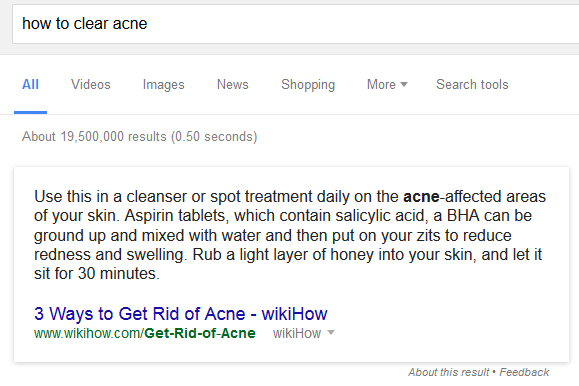We all know that Google has been getting progressively more intelligent when it comes to presenting search results and answering people’s questions for years. The Google Knowledge Graph is the quintessential example of this where it’s gotten so intelligent and effective at delivering information for search queries (it’s primary reason for existing remember), it’s beginning to seemingly do it to a fault where it’s stealing website traffic. But let’s not get ahead of ourselves, let’s answer the question of what is the Google Knowledge Graph.
What is the Google Knowledge Graph?
The Google Knowledge Graph can be thought of as Google’s internal encyclopedia-like database of information for hundreds of millions of search terms. If you’ve used Google in the past few years since the Knowledge Graph launched, you’ve seen its physical manifestation in the SERPs for a number of more clear cut and black-and-white searches.
For instance, like with many other businesses, if you search “Google” within Google itself, you’ll find a window full of basic information appearing on the right of the SERPs. For a number of people/places/things searches, you’ll get similar results.
Google is getting better at what they set out to do from the start: provide the best possible search results for its users, better results than its competitors.
At the same time, this can be disconcerting for virtually any business with a website on the internet for the very question this article is about to answer:
Is Google Knowledge Graph Stealing My Traffic?
In a word, yes, it most certainly is stealing at least some of your traffic. Whether it’s your business which is being represented in the Google Knowledge Graph after a search for it, or whether you’re just a webmaster looking to get people to your site where you’ll answer the very questions which GKG likely just solved without the extra action of clicking through to a website needed, Google has found a way to hurt webmasters while serving its own interests.
Not only does Google pull basic facts, but it’s even taken to ripping content straight off of a website and presenting it atop the SERPs (to create various consequences).
Take this basic search which an acne sufferer might input:
The payoff or meat of the article is basically all but revealed in this snippet, leaving people little reason to click through to the article itself. This takes away from valuable traffic to the website which can help the website with the rest of its analytical efforts, and more obviously it strips the website of potential income generated from traffic based ads to the website.
Now we have to concede that in some cases, this may create more incentive to visit the website to see the full content, but in some cases Google will rip the complete content in full.
Doing similar searches, you’ll find step-by-step “how to” articles showing the full steps ripped straight from the website.
It’s clear that at this phase in Google Knowledge Graphs, they still have to find a healthy balance between serving the needs of their own and the needs of the websites which create content to display in Google as there’s not much a webmaster can do about it if they find that their content has been basically ripped and plastered in the SERPs. Whether that webmaster holds the top spot or not, there’s again not much incentive for someone searching for information using Google to visit the website after they find what they need (literally) in the SERPs.
You can make the argument that this weeds out the not committed traffic, those who were just looking for a quick answer and were going to take off anyway, but again it’s costing the website traffic when all traffic is valuable one way or another. It’s one of the more important user metrics, and sure you can make the argument that if you’re already ranking number one overall in Google then what’s the difference from an SEO point of view, but that traffic can spread across your site and develop into more targeted and likely to convert traffic with the more time spent on your site, not to mention it benefits other URLs on your site and their SEO status.
All of this said, ranking number one in Google still beats the alternative, even accounting for the Knowledge Graph, and as its concept develops, you’ll likely see Google make more of an effort to give more obvious credit to the website and encourage traffic to flow to it.
And remember that your targeted audience, the ones who are already more likely to turn into converting customers, will still find their way to your website, so keep optimizing for Google, Bing, Yahoo, etc.
